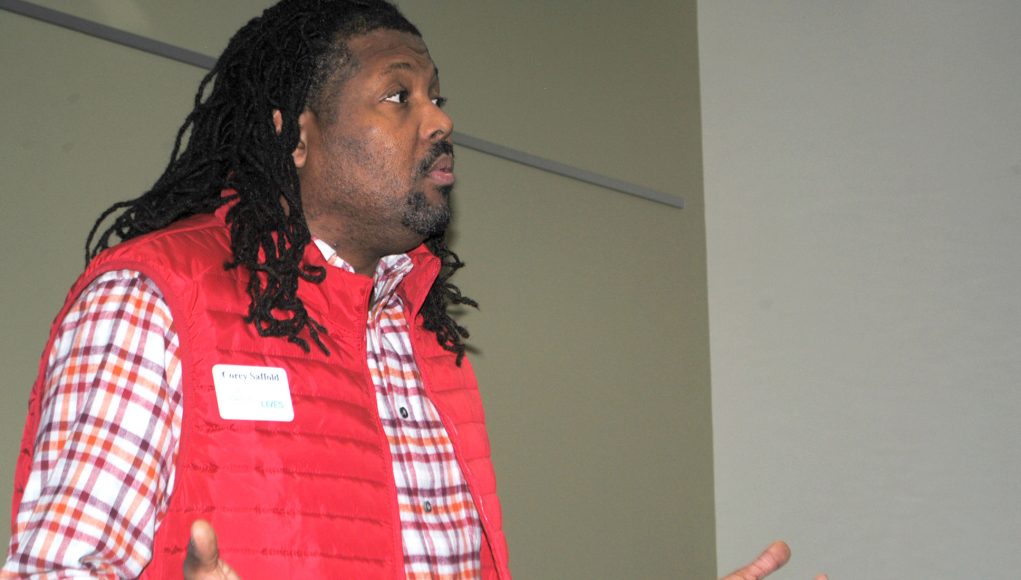Madison Police Officer Corey Saffold joined the force for an unusual reason — the keep people out of jail.
Saffold recalled his own experience with a white Milwaukee detective — a young Saffold had stolen a bass guitar worth enough to make stealing it a felony — who allowed him to right the wrong without falling into the criminal justice system.
“He said, ‘I don’t know if you fully comprehend what you’ve done, but this is a felony. You may not understand what a felony is but you do not want this on your record. Cooperate with me, give it back, and I will do everything in my power to make sure you don’t get charged with a felony,” Saffold said. “I’m able to stand before you today because I didn’t get charged with that felony.”
Saffold spoke before about 30 people at the Mt. Horeb Driftless Historium as part of the Taboo Topics series on Monday, presented by the Wisconsin Humanities Council. He said that experience was pivotal in his decision to join the police force.
“That’s when I made the decision, I have to be a police officer,” Saffold said. “I have to. I have to use my experiences, my cultural experiences especially. You can get two completely different results depending on which officer comes to a call. It can result in a person going to jail. Going to jail is very damaging to someone’s life. If they’re poor, and you can’t afford bail, you have to sit in there, and how they lost their job. What’s next? Housing. There’s a domino effect to going to jail. So I have to be a police officer to go to those calls, and put my life experience, my opinion, into the matter. Otherwise a person could go to jail.”
He also said he has to be a police officer in order to speak to his own community.
“I have to be able to speak to the black community, to let them know, I understand your anger. I understand your frustration. I’m just as frustrated,” he said.
He’s frustrated, he said, about police brutality against African Americans.
He began the talk with three videos of incidents involving white police officers and African Americans — two shootings and one unjustified violent arrest. White police officers behaving badly against unarmed African Americans can come from anything between fear and pure racism, but it’s often unconscious.
“We all have some kind of unconscious bias,” he said. “I don’t necessarily think that’s a bad thing, in and of itself. It doesn’t have to be about race. It could be age, someone younger, it could be a gender thing, it could be LGBT, it could be anything. It’s important that we regulate that thought, understand when it happens and deal with it. That’s the country we live in. To say that’s not happening is really robbing ourselves of the opportunity to come to the table and have honest discussions. It’s not a time to feel guilty. It’s time to have an honest, open discussion and educate each other.”
Saffold also recounted a time when he was off duty and got stopped for speeding in Sheboygan County. His service weapon was holstered on the passenger seat. The white officer who stopped him didn’t believe he was a police officer, even when given his badge, police ID and driver’s license — at least in part because of his long dreadlocks.
“How do I know you didn’t just kill a police officer and steal his badge and gun?” Saffold recalled the officer asking. “I did not fit his idea of what a police officer looks like. In his mind, a police officer doesn’t look like me. His contact with me, in my opinion, was very racist. I think about that experience, I think about all of these videos, and I think about the contention that’s going on in today’s society between the African American community, the community at large and the police, and I begin to ask myself, ‘Why the heck do I stay in this field when people who look like me are continually being gunned down at the hands of police officers? People like me continue to be treated unfairly by police officers, why do it?’”
To answer that question, he always comes back to the reason he settled on as a young man — to make the best of difficult situations.
“I’ll do anything I can to avoid arresting someone,” he said. “The wrong can be made right without anyone being arrested. The main goal is for the wrong to be made right. Police officers in schools have that opportunity to help kids make the wrong right without putting them in the criminal justice system and ruining their lives.”
But the conflict that makes him question his career choice is the same conflict that places him in what he calls “the paradox of being a black police officer.”
“On one hand I want to defend my community because they’re being gunned down by white officers,” he said. “On the other hand I’m an Uncle Tom to my community because I am an officer.”
And sometimes the two sides of the coin can’t be reconciled — as in that traffic stop in Sheboygan County.
“Being a police officer doesn’t trump being black,” he said.





























